Tsara Shelton's Blog, page 4
June 3, 2023
Autism Answer: The Core of the Problem
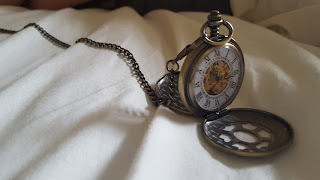 pocket watch
pocket watchWhen working with a piece of machinery we can fairly easily believe that the machine will last longer and work better if we care for the various parts. If we fix and maintain things at the core of the machine, rather than jury-rig or jerry-build or find funny ways to make things work (hold one side this way while shifting the other side that way and then press this thing this way, it's not broken it has personality!) they will last longer. If we take care of a machine by noticing things before they become bigger problems and then properly replace or maintain the working parts, the technology will likely be healthier because of it. That's not to dismiss the tricks we use to make things last. That's not even to say that it is always better to maintain a machine at it's core. But we must admit, usually it is. People are not machines, but it is true that we are also generally healthier and happier when we maintain ourselves at the core. When we investigate why our knees are hurting rather than only avoid stairs; when we explore the reasons behind our behaviors, the beliefs behind our feelings, rather than only wish we did or didn't have those behaviors or feelings; when we play an active role in creating a life we like rather than only feel hard done by when we don't like the lives we have; when we do the investigating and exploring and make potentially healthy adjustments - to our diets, behaviors, environments, beliefs, etc - we last longer and work better. Going with the flow is beautiful, but we must know ourselves well enough to choose which flow, rather than have one (or many) whisk us away; a flow that might threaten to drown us in a life that stifles our ability to be who we like being, or to even discover who that is. That's not to dismiss the little tricks we use to make ourselves happy as we are flowing. That's not even to say that it is always a good idea to follow a feeling or behavior to the core. But we must admit, usually it is. I think we can make ourselves crazy by examining every little detail of ourselves or others as though it is the most urgent matter. But we can also find ourselves drowning in mismanaged health and lack of joy when we do not examine enough about ourselves. If we are particularly different, if our personal machinery behaves in ways that are unusual or extremely challenging, we will find it harder to maintain ourselves, I'm sure. But like an unusual or uncommon piece of machinery, something unique and not mass produced, we are still capable of finding our core and keeping ourselves going. We will have less people who will understand or make space for us, less places to find the parts and information we need, but it is there. People are not machines (though some of us have machines as part of ourselves) but people created them. And we created them for us, and sort of in our own image. We build things and explain: This works to move that which shifts this which sends a signal to that which interprets the signal based on this while over here the valves (if properly lubricated) will pump this and ignite that. That's how we work. One thing leading into the other thing feeding this other thing and a gazillion things working for and against each other in order for us to be, well, us. <--- Yes, I paid attention in biology and know smart science things.
I do understand the people who scoff at others for caring a lot about nutrition, exercise, mindfulness, and more. I do understand. In truth, I treat my machines poorly, choosing not to take care of what's going wrong but instead jury-rig or bandaid. (Though I try not to scoff at the folks who do take good and proper care of their machines.) But finding a good balance between taking good care of ourselves and each other, while relaxing and not allowing the work of taking care become a problem itself, is something we ought to applaud. After all, we are responsible for ourselves, and if we applaud that in each other we will be better. Better at being healthy and better at applauding each other. Don't be afraid to ask why you feel broken or unable to function properly. Don't be afraid to look inside yourself and seek the core of the problem. Always know there is something you can do and you are not unworthy of the work. You are not a machine, but it's okay to think of yourself in that way if it helps. Something that can be maintained, upgraded, made to work well within the parameters of the machine it is. Take care of yourself. Not in a "hold one side this way while shifting the other side that way and then press this thing this way, it's not broken it has personality!" sort of way, but in a getting to the core of the problem way. (Important Note: when we take care of ourselves by getting to the core of the problem we continue to have personality!) Be patient, it can take time. And admittedly you might not find the core of the problem, but if you don't try you are at risk of adding cumbersome piles of misleading blame over it. You are at risk of wasting time pointing out problems of others because it is easier to see what appears broken than to sift through the mechanics and minute details of every little piece that makes you tick. But, man! It is rewarding work! When you find the core of a problem and make a change, everything comes into focus and finds itself working well! It's fantastic and invigorating! (Until the shift moves everything into a new place that creates new areas of problems to find the core of.... but, don't let that stop you! The more you explore your own health and happiness machinery, the easier it gets to recognize what's up.) People are not machines. But it can be useful to pretend. Hugs, smiles, and love!!Autism Answers with Tsara Shelton (Facebook)
Published on June 03, 2023 08:04
May 31, 2023
Autism Answer: Hold Him This Way
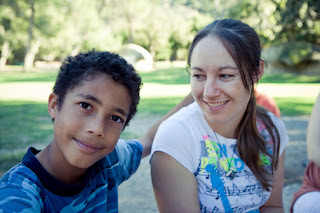 Declyn and me
Declyn and me "Hold him this way," my mom suggested, holding my youngest son up in her arms, away from her body, while encouraging eye contact with her loving smiling eyes. He was little, in my memory not quite a year old, but we were noticing sensory stuff and lack of eye contact. We weren't worrying about it but we were noticing. And we were following his cues while hoping to help him feel our love. As Declyn grew, this sort of noticing and following and leading continued. He had a debilitating case of hyper empathy, any amount of uncomfortable energy could hurt him to the point of a meltdown. Meltdowns he chose to have alone, crying and talking to himself (or the people embroidered on his pillow) until he was alright. He got good at helping people sort out their feelings, which was a form of self-preservation. He had sensory issues that affected him in several ways: he vomited often, he was overstimulated often, he wanted to wrap his fingers in my wet hair often. In each case when I would notice, I would follow his lead and then attempt to help him make sense of what was going on for him and then lead him towards comfort - with himself and the world around him. Parenting Declyn was wonderful. We were close. We understood each other. We had deep conversations and shared our inner selves. At least, that's what I thought.
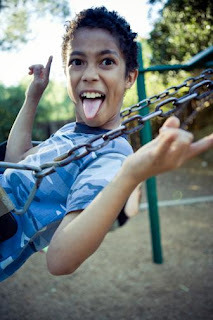 Declyn
Declyn Turns out, I was quite mistaken! Oh, we have always been close, but he (along with all of his brothers) hid so much from me. I knew them, but also I did not. But I am not wrong in remembering much of our closeness. Of how much Declyn impresses me and finds ways to connect and have fun with me. So this morning, in celebration of Declyn on his birthday, I roller skated and rocked out to the entire soundtrack for The Greatest Showman . Because that is a memory of our closeness. Declyn and I love to sing our hearts out, loud and proud, proper pitch and right words be darned! When we are in a car together we are unstoppable! From blocks away you will hear us coming (and though you are not likely to say "what lovely singing voices" you hopefully will think "what passion and joy"). When Declyn's brother bought him The Greatest Showman soundtrack, after having taken us to see the movie in theaters, it was an all out oh man we love these feelings rock out fest. For months! We were almost addicted! I didn't think about it then, but today, as I rock and rolled, I recognized why so much of the music would hit hard for my youngest son. The lyrics, the dreams, the "this is me" declaration, these and more are deeply Declyn. So today, I'm holding him this way. Holding him up, remembering and reliving and feeling, while hoping he will feel my love. A love I am pushing out into the world with intense rocking out energy. Perhaps his hyper empathy will help him feel it: as far as Montreal, Quebec is from Fallbrook, California, I wouldn't put it past him. He feels things. And when I hold him this way, I feel them too. Happy twenty-third birthday to my darling Declyn!I love you!! Hugs, smiles, and love!!Autism Answers with Tsara Shelton (Facebook) If you want to rock out with me and Declyn, here's one of our favourites:
Published on May 31, 2023 10:31
May 3, 2023
Autism Answer: The Rash (or: Sensory Issues and Behaviors)
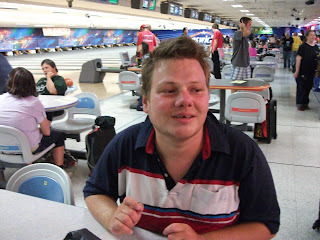 My brother at bowling, his face is red from a reaction to a snack
My brother at bowling, his face is red from a reaction to a snackRandomly, and with no reason I can confidently get behind, I have patches of an incredibly itchy rash calling attention to themselves in a variety of places on my body. Aside from the part where I am (not very actively) attempting to identify the reason behind the rash, there is something else I am doing. Paying attention. Noticing how I feel and how it is affecting me. I love these opportunities. When my body hurts or itches; when my face calls attention to itself with blemishes, bruises, or welts; when I hurt or itch and it is calling attention to itself with blemishes, bruises, or welts - I like to notice how it influences my behavior and the behavior of folks around me. This rash, for example, feels sooooooooooo goooooooooood to scratch! I've had mosquito bites that feel good to scratch but this is something special! However, I am aware that it is generally a bad idea to scratch a rash, so I am trying to avoid thinking about it. I'm picking clothes specifically with the intention of not tickling it into awareness. I'm also choosing clothes meant to keep it from being seen. It isn't pretty, but more than that I don't want people consistently asking me about it or being concerned. There are more things I notice, but the point is my focus is on noticing. I try to take advantage of these opportunities to remember we are all living inside brains and bodies that behave in different ways, and we are all making choices that grow out of those different brains and bodies. It is a particularly helpful reminder for when my brother - who is unable to speak clearly - is doing seemingly odd things with his body: prodding the underside of his nose, smacking his thigh, rocking his head. I admit, when I was young and my mom would wonder, "Why is he doing that?" my thought would be, "Um, because he's weird." And, honestly, between you and me, I actually thought that was the answer. Luckily, my mom isn't so easily side tracked. She really wondered because, as I now understand, there is a reason and it can be helpful to know what that reason is. Following these clues doesn't always lead to knowing how to stop the behavior, how to fix the numbness or itch or pain, but it can. And it can lead to understanding it. And the attitude of knowing there is a reason leads to seeing the behavior differently; usually with less annoyance and more understanding.
I won't fool myself into thinking now that I've had this rash I know what it's like to live in a body that has sensory sensitivities or a noticeable rash, I'm pretty sure mine will be temporary. Hence, I can take advantage of this opportunity from that privileged place. I am grateful to have these opportunities. I don't prefer pain or itching or attracting attention with bruises or blemishes, I don't wish I could keep them, but I do like attempting to understand how different my choices and beliefs would be if I did always or often have those things. Funnily: part of the reason I started to love the opportunity to notice and imagine is I prefer it over trying to figure things out or fix them. I am lazy that way. I'd rather have a rash or a pain and notice my behavior, assume the problem with solve itself, rather than focusing on figuring it out or fixing it. I like letting things happen and finding a way to be okay with them. That's easier for me. (It is not better, just easier. I have waited to the point of danger before.) This is something that, maybe, grew out of me spending this first half of my life in a brain and body that are fairly plain? Fairly middle of the road? This type of laziness probably grew out of me living in a body that, so far, has almost always figured itself out. I like that. I look forward to learning how to like it when my body changes and I do have to figure more things out. Hopefully all this noticing will help me have empathy (not sympathy) for myself.
Now, if you'll excuse me, I'm going to notice myself sneaking off into another room where no one will witness me scratching this rash and it will feel sooooooooo goooooooood... Hugs, smiles, and love!!!Autism Answers with Tsara Shelton (Facebook)
Published on May 03, 2023 07:14
April 5, 2023
Autism Answer: Logging In
Logging into someone else's social media account and checking out their ads, newsfeeds, recommended posts/videos can be a healthy exercise. It happened to me accidentally many years ago, when I was still new to the internet, and it genuinely freaked me out. One of my sons had used my computer to check his Facebook feed and didn't log out. When I later opened the app I was shocked. The world was behaving strangely! It was weird and unfamiliar. For a few moments I literally felt lost and worried. What had I missed? I quickly figured out what was going on and got over my confusion, but that shock taught me something that stayed with me. The conversations, the ads, the shared videos and photos, they were a peek into a different world. One that was not created for me, one that was not specifically tailored by an algorithm that pays attention to my likes and dislikes, my comments and where my screen lingers, but was instead tailored to my son; who he was at the time. Yet, these were all conversations, interests, quotes, and products that are part of the world I live in. Just because they aren't pushed my way doesn't mean they aren't influencing my environment, which influences me. In the example of my son's feed, it was mostly anime, ads for video games, and people complaining about the world. But I have seen even more since then. For example, did you know that lots of people find it clever to make fun of people who think differently than themselves? Call them stupid and stuff? I thought that was only outliers, people struggling with social skills, and/or people with the job of agitating in order to create activity and misinformation. But it is far more common than I thought, which is good for me to understand. Also, did you know make-up is still a thing? Like, a big thing? I thought it mostly died out for mainstream use when I stopped using it at nineteen. But turns out, according to the push from advertisers and influencers on a friend's Instagram feed, it's not only still a big deal but there are a gazillion ways to wear it, equally as many reasons to wear it, and don't worry there are ways to look like you're not wearing it while you wear it so you can simply be naturally pretty because - duh - everyone should want to be pretty but also you should be confident in your natural beauty without makeup or a filter but here is a filter and makeup tutorials and reviews and promo codes because let's be serious you can't compete with those of us wearing it if you don't wear it. <--- I would not have survived as a young girl in this world. I don't notice this stuff because I don't see this stuff, not really. Oh, there are make-up aisles and ads on the sides of buses, but I don't see them, not really. It's when someone I'm with looks, perks up, click's "like" with their attention that I see it. And I notice sometimes a person yelling obscenities at other drivers, calling them stupid and stuff, when they don't like something they did, or something they almost did, but I don't really think of it as how a lot of people are. I think of it as uncommon. It doesn't really effect me to notice for a moment. Because I don't stay in these environments, seeing for a moment doesn't mean much. What does effect me is the affect it is having around me, on the people I spend time with, the people I live in the world with. And, conversely, my own world, the one that is cultivated more for me and my interests, though it may seem alien to others is of consequence to them. We can't truly learn from each other if we are too completely unaware of where other people's ideas are growing out from. If we are entirely clueless to the behaviours, comments, images, beliefs being targeted and consumed by each other, we become unable to truly understand each other. Having diverse stories around us, people, books, films, news, opinions from places and times we are not from and where we don't stay, this is a meaningful way to grow our understanding of each other. Our similarities and differences. Needs that some might have that others rarely see. etc. But it is also useful to simply, sometimes, visit a drastically different person's echo chamber. Log into their social media for a bit, if they're comfortable with it. Invite them to visit yours. It can be shocking! Sometimes uncomfortable, sometimes simply boring, but always a little peek at what is "normal" to someone that is not you can remind us that "normal" is a creation. For example, did you know it is normal for a lot of people to care about cars?! I have a little brother who cares so much about cars, about their shape and how well they're made and how they might change, that I used to think he must be alone in the universe. Guess what. NOPE! Oh, he might be alone in the specific way he gets emotional over the future of cars, but he is not alone in caring. Not by a long shot! In fact, cars is an extremely normal thing to care about, turns out. Interestingly, that particular brother of mine is not generally considered normal.
 So, visit a new echo chamber. What reverberations do you notice? What reflections do you see? Hugs, smiles, and love!!Autism Answers with Tsara Shelton (Facebook)
So, visit a new echo chamber. What reverberations do you notice? What reflections do you see? Hugs, smiles, and love!!Autism Answers with Tsara Shelton (Facebook)
Published on April 05, 2023 09:51
March 10, 2023
Autism Answer: Fix My Child
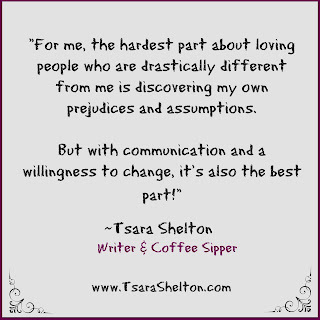
When parents want to fix their child, or try to find a professional who can fix their child, they do not really mean they want someone to fix their child. To mend or repair them.
They mean they want things to be less hard for themselves and their child. They mean they want people to stop staring and judging them for behaviors or appearances. They mean they want to know what to do when they see their child hurting, screaming, behaving strangely. They mean they want to know what to do when traditional parenting tips, comments, and expectations seem unreachable or ridiculous. That's not to say they don't want to help their child solve problems brought on by disability or dysfunction. They do. And they may say they want to fix their child.
I think they mean they want a future for themselves and their child that seems healthy, happy, successful, possible. They mean they want to know what that could look like and what to do to help it happen. They mean they want to see their child without the interference of needing to fit that child into expectations that were built before the child was born. They want to see who their child is and who they can be, know they can help them overcome the hard stuff and find what works for them, know the world will have space for them to grow and carve out a life that suites them. They mean they want to know what to do to make all of this happen and to not be too lost and overwhelmed and beaten up along the way. That, I think, is what they mean when they say they want someone to fix their child. I don't think they are trying to call their child broken, exactly. I think they want to help them be the best version of themselves with the most amount of confidence and the greatest opportunities for independence or growth. And in many cases that means finding uncommon answers that ask for more than we're used to asking for. Answers that bring us to a place where we reevaluate so much we once took for granted.
When someone says they want to fix their child, I think it is because they want to reconstruct, renovate, and overhaul their situation, their child's situation, and reactions to them and their situation.
Whether or not we have children of our own at the moment, we can help make raising children easier on others. We can reconstruct, renovate, and overhaul the way we react and the expectations we have when spending time in public spaces.
We can fix the feeling of needing to fix things.
Hugs, smiles, and love!!Autism Answers with Tsara Shelton (Facebook)
NOTE: Those of you raising or helping raise children, those of you hoping to have a little help knowing what to do, please visit the All Brains Grow website for access to that help. It is a beautiful place with beautiful ideas!
Published on March 10, 2023 06:13
March 2, 2023
Autism Answer: Where There Is Yelling
 Hand on a hip in anger or judgement
Hand on a hip in anger or judgementSome people remember with a sense of sharpness things they learned while being yelled at. For the most part, I shut down when people are yelling. Particularly angry yelling. I am quickly afraid and disappear so deeply into the fear that I can't decipher much of what is being said or remember well what the yelling was specifically about. However, I can remember with clarity things I choose to learn while my FEELINGS are yelling at me. When I am extremely embarrassed, when I feel horrible for being the cause of a serious problem, when I am extremely afraid. Sometimes that means I remember things I choose to learn where there is angry yelling because angry yelling causes me to be afraid, but the things I learn don't come from what is being yelled. Instead they come from me, from the place hidden away in the fog of fear where I am unable to decipher much of what is being said outside of myself. Hence, I tend to remember the stuff my mind is saying to me about my reaction to the yelling. Mostly, my mind is mean to me in those moments. I'll remember me putting myself down and using the moment as proof that I'm a pathetic whimpy useless piece of a person who is sitting paralyzed in fear rather than engaging with the person or people who are yelling.
Sometimes, I will remember what the yelling was about. Never, though, will I remember it in a better way because of the yelling. Though sometimes I will remember bigger because of it. It will be louder in my mind, the memory itself yelling at me. I am one person. My response is not necessarily common or uncommon. To be honest, when I watch movies and tv shows I can't help but notice many people yell at each other, and so I assume it's fairly common to yell and that yelling isn't always so hard for folks. And don't get me wrong, I have yelled. I have yelled at my kids, I have yelled at my brothers, and I have yelled at my mom. When I have yelled it was never because I had a handle on things, it was never because I knew yelling was the right choice. When I yelled it was because I was overwhelmed and frustrated and screaming to get out from under it all. The people I yelled at were not likely benefited from my yelling. And I definitely wasn't. My mom, however, can use yelling well. To break through to one of my brothers before they go too far, to surprise someone into listening, to change a behavior by influencing a brain. She knows how to use yelling. Mostly, by not using it. It is one of the least commonly used tools in her toolbox. (I highly recommend watching her international docu-series Fix it in Five with The Brain Broad, particularity season two where she works with a violent teen struggling through puberty, in order to see how she breaks into behaviors without using yelling, and how she effectively uses yelling.)
Where there is yelling there is response to yelling. Not everyone responds the same and not everyone yells the same. I am not good at yelling. I am not good at being yelled at.
"Teach, don't hurt. Your child will often remember how you punished them but seldom remember why. Spare the rod and teach the child." ~Dr. Lynette Louise, aka The Brain Broad, aka My MomMy mom always has her mind on the teaching part. Children, particularly autistic children, are exceptionally influenced by the energy around them. Yelling is a kind of energy that is not easily guided well. Be careful with it. Not only around children. And for those of us who don't handle it well, let's try not to be afraid of it, either. (Errrrrr.... great. Now I'm afraid someone will yell because I admitted I'm going to try and not be afraid of yelling. Giggle!) Hugs, smiles, and love!!!Autism Answers with Tsara Shelton (Facebook)
Published on March 02, 2023 10:15
February 15, 2023
Autism Answer: A Consequence of Punishment
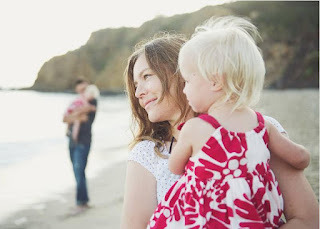 On the beach: my sister, two of her four daughters, and her husband.
On the beach: my sister, two of her four daughters, and her husband.I was a mom before my sister was. I adored the way she loved watching me with my sons! Soon, my sister had children of her own. And I quickly adored watching her with her daughters! I watched as my sister focused less on punishment for her children and more on consequences. As a mom, I loved this. The consequence was I began to do the same. Things didn't have to change much. When my boys made a mess they would still be expected to clean it up because that's a natural consequence. When they would fight with each other they would still be expected to stop fighting, to apologize if it seemed appropriate, to go to their beds and take time to calm down and think about the situation if that made sense, because those are some consequences of fighting. If they didn't listen to me when we were in the grocery store, if they had a tantrum to try and get something they wanted that I was unwilling or unable to get for them, I still dealt with the attitude in much of the same ways I always had (mainly by freaking out internally over hoping I would handle it right and knowing only that whatever I did I couldn't let the tantrum be how they got something) because there are consequences to being whiny or mean. The difference when I focused more on consequence than punishment was less about what happened and more about how the happening was framed. What lesson I tried to highlight. I'm not a big believer in "if you do this you might get caught, imprisoned, ticketed" etc, and more a believer in "if you do this these are the sorts of things that might happen to you and your environment." As a mom but also as a citizen in society. I think a consequence of focusing on punishment is that we too often teach "don't break this rule or you'll get in trouble" when we could be teaching "here are the reasons we have decided as a society/family to have this rule." It's not that I think consequences should never feel like punishments. It's more that I think focusing on the reality of consequences helps us better understand the fullness of our actions. Everyone involved is given more opportunity to explore the potential consequences. I think the shift in focus helps us remember to be responsible for ourselves, to be less combative with people we perceive as punishing us, to be more aware of the myriad of consequences rather than see only the big shiny punishment. If the consequence of me sharing this idea is you decide to punish me by telling me I'm a silly old lady with naive dreams of a world that can change when we change our focus, no problem! I'll just focus on the part where you cared enough about my idea to respond with thoughts of your own and the consequence will be I feel less punished. tee hee! Hugs, smiles, and love!!Autism Answers with Tsara Shelton (Facebook)
Published on February 15, 2023 12:38
January 24, 2023
Autism Answer: Representation and Robots
 Some pretty cool technology! A radio intercom thingy on our wall.
Some pretty cool technology! A radio intercom thingy on our wall.I am not much interested in technology or cool new gadgets. When robots can do amazing things, when virtual reality is wildly realistic or whatever, I kinda think, "Oh, neat." If I bother thinking anything at all.I'm aware that it is fascinating and impressive, but mostly because of the reactions of others. Largely, my under-reaction is because I am personally not interested. My interests are just different, that's all. But I also think I'm unmoved in part because I've already seen technology that does unbelievable things, and robots that impress with their ability to seem human while having the strength and capabilities of doing superhuman things, in movies and on TV. I'm less impressed because of the representation robots and other tech has in the movies. I've seen it a lot therefore I assume it's not that impressive or new. I am not in the tech world, hence I am easily confused by what is actually cool to see in the real world. For folks who do not have many friends or family members with disabilities, this might be something to keep in mind. If they are easily impressed by a disabled person doing mundane things, perhaps it is because they are not exposed to disabled people doing many things.
Additionally, when they are under the impression that having a disability means life is a constant struggle, a hard fight against the world and the distress of a broken brain or body, a sad state that can hardly be helped, perhaps it is because they are not exposed to complete and complicated stories of people with disabilities.
When I move about in the world I don't expect to see robots or wicked cool technology all over the place, but I admit to being unimpressed and hardly surprised when I do. I get that it is cool, it just doesn't spark any "isn't that cool?" thoughts in me. (I am kind of boring. I like trees. Trees are cool.) When we move about in the world we are in the company of people with disabilities, that's just a fact. Sometimes more people, sometimes less. Sometimes visibly disabled, sometimes not. There's nothing wrong with noticing if something is cool (people are often doing cool things, sometimes those things include robots!) but I think it's unfortunate that though we are exposed to diversity in reality, we are less exposed in our stories. It is our stories that help us get to know each other. They fill in blanks, expose us to possibilities, give us many more directions in which to imagine and care. Robots are cool. People doing things despite physical, emotional, societal, financial challenges is cool. With exposure in our stories, done well and with honest complexity, we are able to include all of these cool things in our expectations. We'll expect and invite more people to be themselves in our public spaces.
That, I think, is the ultimate in cool. (Though I confess, my opinion on what is cool isn't highly sought after. Giggle!)
Hugs, smiles, and love!!!Autism Answers with Tsara Shelton (Facebook)
Published on January 24, 2023 09:35
Autism Answer: Representation and Robots in Movies
 Some pretty cool technology! A radio intercom thingy on our wall.
Some pretty cool technology! A radio intercom thingy on our wall.
Additionally, when they are under the impression that having a disability means life is a constant struggle, a hard fight against the world and the distress of a broken brain or body, a sad state that can hardly be helped, perhaps it is because they are not exposed to complete and complicated stories of people with disabilities.
When I move about in the world I don't expect to see robots or wicked cool technology all over the place, but I admit to being unimpressed and hardly surprised when I do. I get that it is cool, it just doesn't spark any "isn't that cool?" thoughts in me. (I am kind of boring. I like trees. Trees are cool.) When we move about in the world we are in the company of people with disabilities, that's just a fact. Sometimes more people, sometimes less. Sometimes visibly disabled, sometimes not. There's nothing wrong with noticing if something is cool (people are often doing cool things, sometimes those things include robots!) but I think it's unfortunate that though we are exposed to diversity in reality, we are less exposed in our stories. It is our stories that help us get to know each other. They fill in blanks, expose us to possibilities, give us many more directions in which to imagine and care. Robots are cool. People doing things despite physical, emotional, societal, financial challenges is cool. With exposure in our stories, done well and with honest complexity, we are able to include all of these cool things in our expectations. We'll expect and invite more people to be themselves in our public spaces.
That, I think, is the ultimate in cool. (Though I confess, my opinion on what is cool isn't highly sought after. Giggle!)
Hugs, smiles, and love!!!Autism Answers with Tsara Shelton (Facebook)
Published on January 24, 2023 09:35
January 21, 2023
Autism Answer: How "You" are You?
 Me at the bus stop
Me at the bus stop"She's so nice; such a sweet quiet girl," they would say about me. They were saying it because, well, I was being nice and, also, quiet. I don't know when I started being nice, sweet, and quiet because they said I was, and I liked that they said I was, but I did. I remember seeking that input, wanting to know they were still thinking of me as nice, sweet, and quiet. Wanting them to validate that I was still the me they had said I was. I was a child. I was newer to the world than the adults. I was someone, born as someone, but I was also a small someone. I looked up at the grown-ups and was told what to do by them and grew in the direction of attention. I grew out of a seed that was me, but my growth was encouraged and influenced and fed by those I listened to and learned from. It was not their fault, the adults, when my attempts at being nice, sweet, and quiet became unhealthy for me. It was me, trying to have people think of me as nice, sweet, and quiet that was dangerous. Rather than explore what it really means for me to be nice, to be quiet, to be sweet, I chose - for several years - to try and elicit a response from people that proved they thought I was nice, sweet, and quiet. During those years I failed to learn that it is nice to say no to what I don't want or what I don't believe in, it is sweet to believe in someone so much that you push them to try harder (my brothers too often bore the brunt of my attempts at sweetness while I talked condescendingly to them and let them give up) and being quiet because I was afraid to say the wrong thing was not something to be proud of; being quiet because I want to learn what others have to say and give them space to say it, that was my best kind of quiet. I pondered much of this often when I became a mother. How to encourage healthy growth in the direction of who my sons are. How to tell them who I see when I see them without taking away any potential for all the other thems they might be, and without pushing them to fit into any expectations. Man, it's not so simple! It's such a common suggestion: Be yourself. Discover yourself. Don't be who you think others want you to be. etc. And it's good stuff. Yet, we are always ourselves, aren't we? I go back to the time I was trying to fit into a description of me and when I listen to my thoughts from that time, they were me. They were me trying to be a me that is complimented, or noticed, or impressive, or whatever it was I hoped for at the time. But, I was me. As a parent, I try to leave room for who my children choose to be. But I also tell them who I see. I can't help it. I love who I see. When our loved ones have certain types of disabilities or disorders I think it can be even harder to get this right. The challenges of communication, the uncommon behaviors, can challenge us in ways we are unprepared for. We start seeing what we don't like, what we are dealing with, what we think we are supposed to be looking for, what is clashing with the environment, and even when we put a positive spin on what we're seeing we're still seeing from a place of behaviors, where things are often lost in translation. Behaviors are communication, but we are often unequipped to understand them in any useful or real way. As we help them discover who they are, help them grow in the direction of attention, we may make the mistake of giving the wrong attention in the wrong places. And as our children grow they will always be themselves, but with too much pollution in their environment they will be unable to grow into their best selves. (I hope you'll visit the All Brains Grow website to learn how to help our special needs children grow in healthy powerful wonderful ways.) It think it's true, you should be true to who you are. I think being yourself, discovering who you are and what you really believe, is a valuable pursuit. This does not mean we should ignore who the world says they see when they see us. It is feedback. It is worth incorporating in our own estimation of who we are. I am nice, but not everyone would think so. Because being nice, I now know, is not the same in everyone's opinion. But in mine, I am nice. So, know who you are. Be you. Be you, in this world with others. "The world will ask you who you are, and if you do not know, it will tell you." ~Carl Jung Hugs, smiles, and love!!Autism Answers with Tsara Shelton (Facebook)
Published on January 21, 2023 12:23



